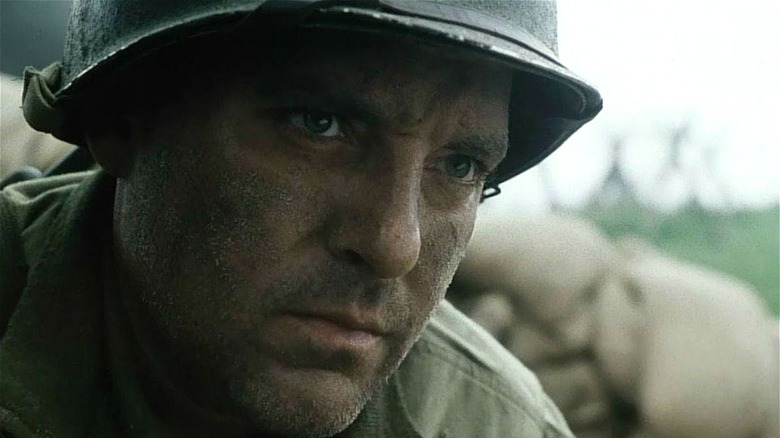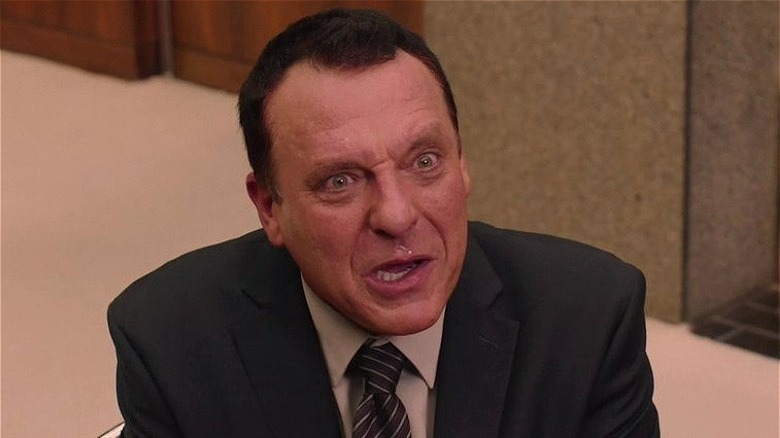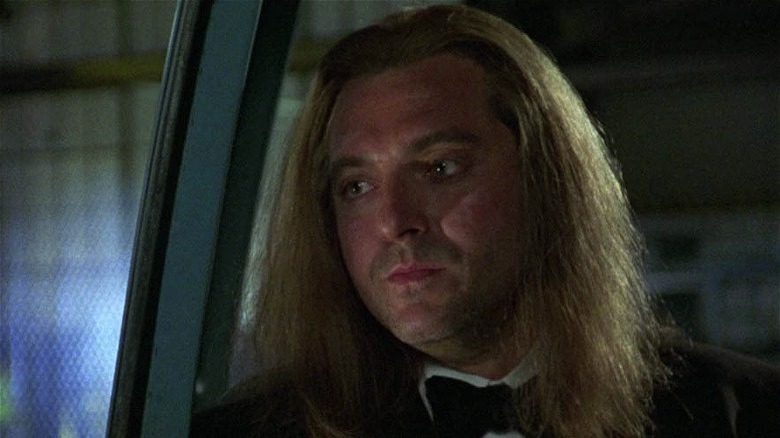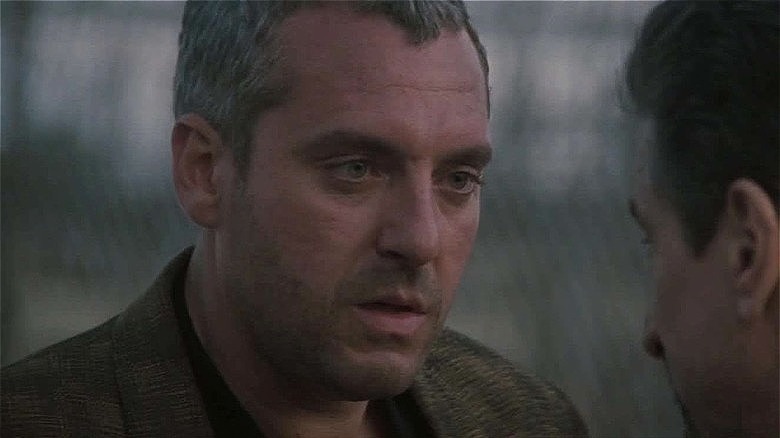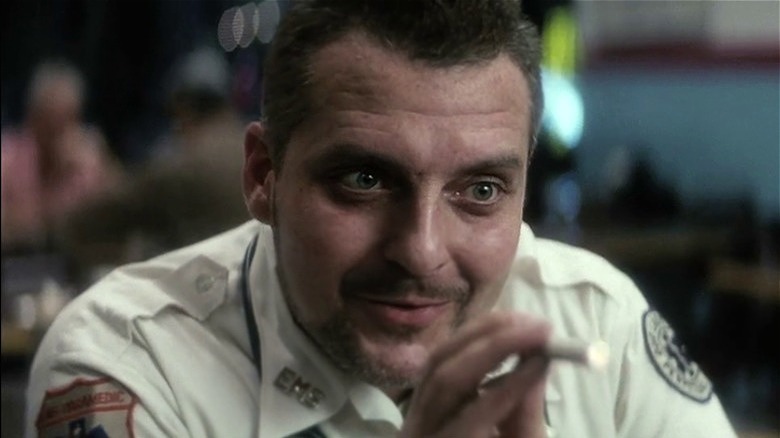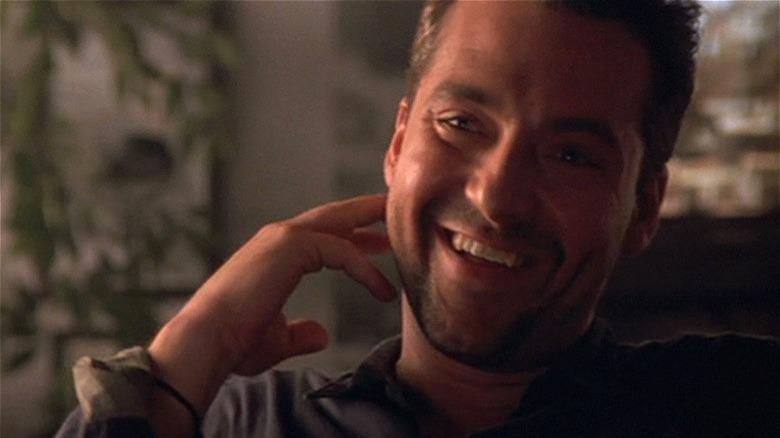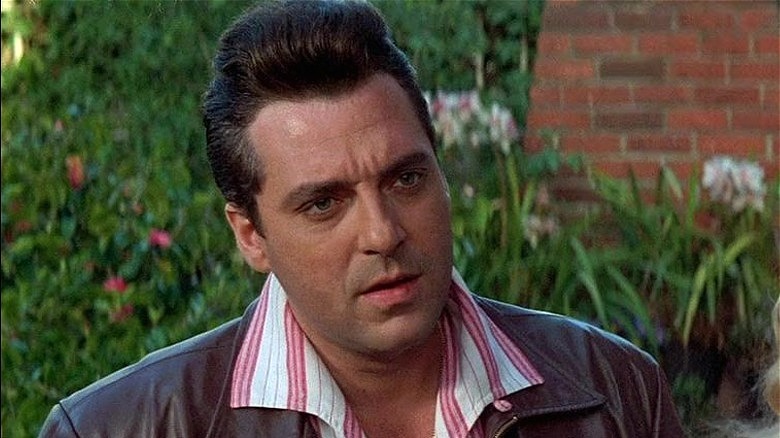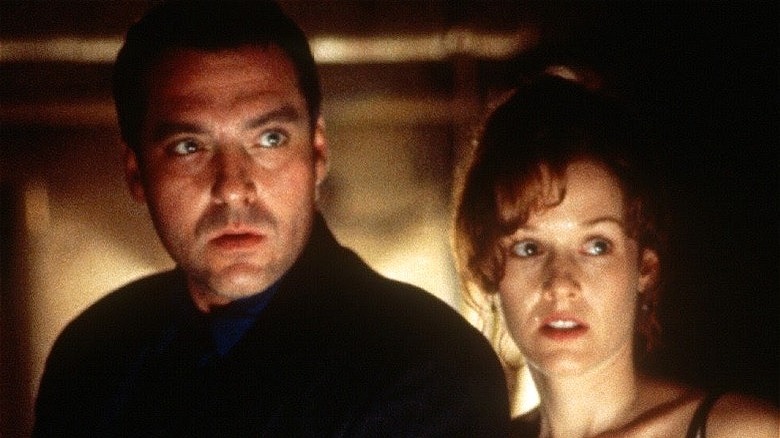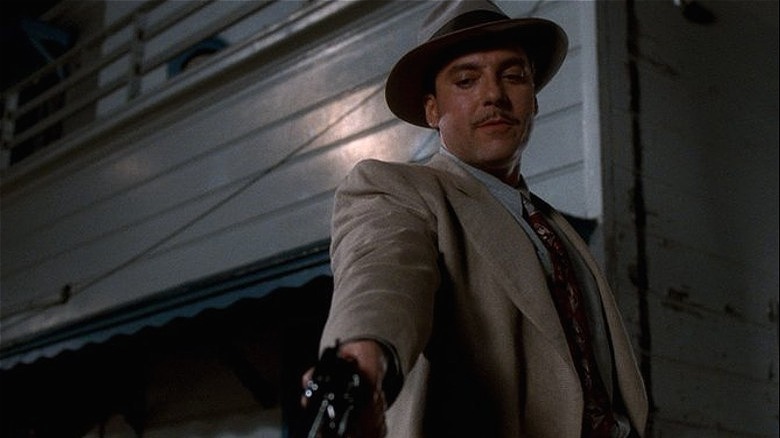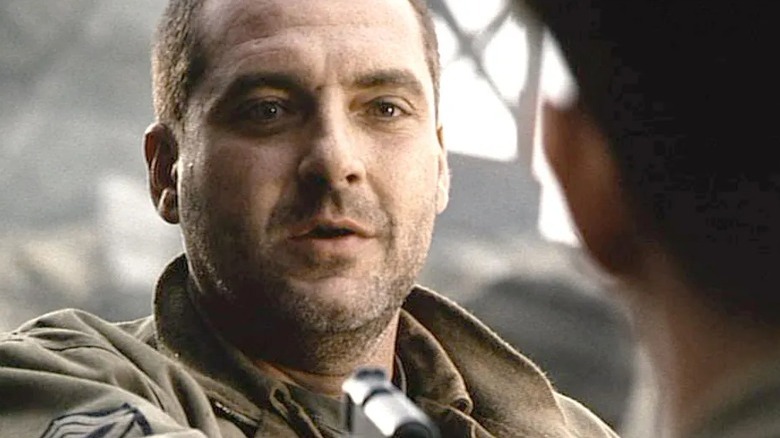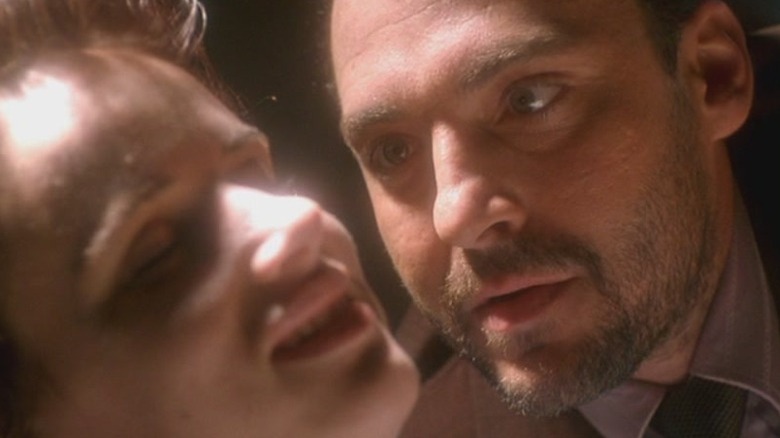Tom Sizemore's 10 Best Roles
Tom Sizemore passed away on March 3, 2023, about two weeks after suffering an aneurysm. Once one of Hollywood's most ubiquitous supporting actors, he was always a reliable presence in any film he appeared in, with his trademark ice-cold stare and husky laugh. He also possessed a truly unique attribute: a brooding, taciturn toughness that has become increasingly rare these days, shared by the likes of Michael Madsen, Chris Penn, and Ray Liotta.
Sizemore was a cut above those guys, though, with an uncanny ability to turn his heavy-lidded, sparkling eyes from charming to chilling at the drop of a hat. Look at the actor's cameo in "Enemy Of The State." He essentially plays a comic role, a broad, larger-than-life mobster, and yet when he shifts gears to a more intimidating presence, it doesn't feel jarring, but genuinely menacing instead.
Although he disappeared from the limelight in recent years, there was a time when Sizemore's appearance in a film meant an instant stamp of quality. There are more versatile actors out there, but Sizemore commanded the screen, always drawing the eye in his scenes. His toughness never felt performed or false. His acting style was so intuitive, so real, that it seemed as if you never actually caught him acting.
Rather than dwell on the tragedy of his death, instead, it's time to reflect on Sizemore's career. As such, this is less a ranked list and more a celebration of Sizemore's status as one of Hollywood's most talented, effortlessly charismatic character actors.
Twin Peaks: The Return
In the later part of his career, Sizemore made several appearances on the small screen, in shows as varied as "It's Always Sunny In Philadelphia," "Shooter," and "Lucifer." However, it was his turn in David Lynch's incredible revisit to the world of "Twin Peaks" that reminded everyone what a gifted actor he was. After such a long absence from the limelight, it was really heartening to see him giving such a great performance, especially one so different from his typical roles.
In "Twin Peaks: The Return" he tackles a relatively minor role, but he judges it perfectly, initially playing the bemused straight man to Kyle MacLachlan's man-child Dougie. As with the mob characters played by Jim Belushi and Robert Knepper, Lynch uses the casting of an archetypal tough guy like Sizemore to mess with audience preconceptions. Rather than cutting an imposing figure, his Anthony Sinclair quickly becomes a pitiful nervous wreck, as he is tasked by his criminal boss (Patrick Fischler) with increasingly abhorrent jobs to carry out, culminating in him being coerced into poisoning Dougie, something he is unwilling, or unable to do.
Sizemore's twitchy, anxious performance is miles away from his usual macho roles, and he plays up just how pathetic his character is in his final episode, where he tearfully confesses all his wrongdoing to Dougie and his boss. His emotional outburst is so authentic, so earnest, and yet so over the top. Typically for David Lynch, you genuinely don't know whether to cry or laugh.
Strange Days
A major box-office bomb upon release, Kathryn Bigelow's science fiction conspiracy thriller is more prescient today than ever — and finally seems to be getting the recognition it deserves. Ironically for a film so concerned with the dawning of the millennium, it features what might be the most '90s ensemble cast ever assembled, with Juliette Lewis, Michael Wincott, Vincent D'Onofrio, and William Fichtner all in supporting roles.
Ralph Fiennes plays Lenny Nero, a black marketeer who sells contraptions that allow the buyer to relive old memories and access the same sensations as you did then. When he gets drawn into a murder plot involving two corrupt cops, the only people he can rely on are his best friends, limo driver Mace (Angela Bassett) and muscle-for-hire Max (Sizemore).
Many moviegoers and reviewers were critical of Sizemore's casting, with Empire, in particular, calling him out as miscast, essentially dismissing him as a heavy. However, this does him a disservice as an actor. Sizemore very rarely portrayed a simple villain; there was nearly always more nuance to his characters, and Max is no different. The film itself seems to address this preconception by wrong-footing the audience into thinking he is a villain right from his introductory scene.
Less intense and psychotic than in previous roles (well, for the most part), Sizemore makes Max a soft-spoken, amiable character, and provides a much-needed voice of reason to Lenny. In lesser hands, the leaps in narrative logic might come across as contrived, but Sizemore leaps into the high-concept premise head-first and clearly had a ball with the twists and turns of his character.
Heat
Sizemore inhabited tough guy roles so effortlessly that you almost forgot he was playing a character. He didn't need histrionics to get his point across; he had that still, intimidating toughness that's all too rare today. To paraphrase John le Carre, he had a heavy quiet that commands, and nowhere is that more evident than in Michael Mann's "Heat."
A seminal 90s crime thriller, "Heat" follows two kindred spirits on opposite sides of the law. Consummate detective Vincent Hanna (Al Pacino) hunts down professional thief Neil McCauley (Robert DeNiro). Sizemore plays Neil's loyal right-hand man, Michael Cherrito, with the perfect combination of charisma and menace.
Cherrito doesn't say much, but he doesn't need to, instead relying on that famous gaze he utilizes in a few key moments. His performance can best be summed up in the look he flashes to a bystander in the restaurant when the gang threatens the weaselly Waingro (Kevin Gage). Sizemore doesn't overdo the threat at all. He just gives a measured, hard stare, deploying those steely blue eyes to full effect.
Sizemore fills Cherrito with far more character than is evident on the page, lending him an insecurity and vulnerability you might not expect. When debating whether to take on the fateful bank robbery, he defers to Neil who tells him he needs to think for himself. Sizemore face registers untethered uncertainty — and in that one look you know he's lost without his boss' guidance. Then he utters one of the film's most iconic lines: "For me, the action is the juice."
Bringing Out The Dead
"Bringing Out The Dead" ranks among Martin Scorsese's most criminally underrated films, with a brilliantly unhinged Nicolas Cage performance at its center and a layered script from Paul Schrader. The story examines three nights in the life of insomniac ambulance driver Frank (Cage), and his very different partners across three consecutive shifts. First, there's the measured Larry (John Goodman), who seems more concerned with where he can get dinner than saving lives. The next night Frank is paired with self-centered, religious zealot Marcus (Ving Rhames), and, finally, we meet the utter nutcase that is "Major" Tom Wolls (Sizemore).
It's a great film, but the often depressing subject matter threatens to make it a bit of a slog at times. Sizemore, when he finally arrives onscreen, delivers a timely injection of manic energy. Tom is the most volatile and unpredictable of Frank's partners, and the one he seems to despise most, perhaps because he most closely resembles the future that awaits Frank. With his pallid skin, dark rings around his eyes, and a crazed rictus grin, Tom even looks like a more extreme version of Frank.
Tom is the only one who seems to enjoy his job, and Sizemore delivers a hyperactive, quick-tempered performance that matches the quick cuts and jarring punk soundtrack that characterize Scorsese's film. He describes the ambulance as a warrior that "I have tried to kill... many times. But he will not die." Later, we see him literally attacking his ambulance with a crowbar. Sizemore approaches his role with equal ferocity, especially when Tom and Frank hunt down someone, anyone, to beat up in an attempt to release their pent-up energy and balance the scales for all the lives they save.
True Romance
There are many incredibly memorable performances in "True Romance," with an eclectic cast portraying a range of colorful supporting characters, from Gary Oldman's dreadlocked pimp to Brad Pitt's nonplussed stoner. It might be a stretch to say Sizemore is the film's most memorable character, but he and Chris Penn deserve credit for making their relatively minor characters stand out.
In only a handful of scenes, Sizemore leaves an indelible impression as the laid-back yet intense detective Cody Nicholson, who is introduced busting Elliot Blitzer (Bronson Pinchot) with a bag of cocaine. Sizemore and Penn (as his more by-the-book partner, Nicky Dimes) were very similar actors, and complement each other perfectly as a contrasting double act. They finish each other's sentences, correct their boss' grammar, and effortlessly work the good cop/bad cop routine to talk Elliot into wearing a wire. Sizemore is the excitable, passionate Yin to Penn's more pragmatic Yang.
Take the masterful scene where Clarence (Christian Slater) pulls a gun on Elliot in an elevator while Cody and Dimes listen in on the wire Elliott is wearing. It's a supremely tense sequence, full of iconic Quentin Tarantino dialogue, but it's Sizemore's reactions that make the scene jump off the screen. The involuntary cackle he gives when he hears Elliot break down is hilarious, as is his casual assurance that, "He's not going to kill him," undercut immediately by the following cut, where he mutters, "He's going to kill him."
Heart And Souls
"Heart And Souls" is a heartwarming, unheralded gem without a cynical bone in its body. The high-concept premise centers on four unconnected people who are killed in a freak bus accident that somehow connects their souls to a newborn baby, Thomas. As he grows up, the spirits attempt to resolve their unfinished business before passing over to the afterlife and use the unwitting Thomas (Robert Downey Jr.) as a vessel to achieve their individual goals.
It's a testament to the abilities of everyone involved that despite being unapologetically sentimental and cheesy, the film never feels too saccharine or cloying. Sizemore plays Milo, a thief striving to rectify a wrong that occurred 33 years ago, by retrieving a stolen book of stamps. He's largely comic relief, which he proves adept at, but there's also a pathos to his character; the sheer elation on Milo's face when he returns the stamps to their rightful owner is genuinely moving, as is his quiet farewell to his friends.
Sizemore, Alfre Woodard, Charles Grodin, and Kyra Sedgwick share a touching chemistry as the four disparate personalities, and the film (and their performances) make the friendship ring true. Despite having little in common, after a lifetime of watching over Thomas, they inevitably form a close-knit bond. The scene in which the four spirits and Thomas sing "Walk Like A Man" together is an undeniably feel-good moment and it works because all five actors commit fully to the dance routine's silliness. There's no winking, no ironic detachment. It's just a wonderful movie, and Sizemore throws himself into his role, proving that he could just as easily turn his talents to comedy when given the opportunity.
The Relic
Sizemore was rarely offered leading man opportunities, but when he was, as in Peter Hyams' monster movie "The Relic," he proved to be a natural. As the superstitious Chicago cop Detective Vincent D'Agosta, he underplays his role beautifully, flashing a wry smile of disbelief at the increasingly bizarre events rather than overdoing it.
"The Relic" is not a subtle film, with some questionable leaps in logic and acting that ranges from incredibly broad to just plain bad. This only serves to make Sizemore's natural, lived-in performance all the more impressive, and any goodwill the film has generated is largely due to him, and the relatively original monster design. It often feels like Sizemore has walked in from another film altogether. His hard-boiled demeanor and the backstory of why D'Agosta is so superstitious are occasionally at odds with the generally schlocky tone of the rest of the film. It would be easy to portray the grizzled detective as a cliche, but Sizemore avoids the pitfalls of a role like this and plays it completely deadpan. His dry delivery of "How do you get custody of a dog?" is genuinely funny.
The film also earns points for not trying to contrive a romance between D'Agosta and evolutionary biologist Margo Green (Penelope Ann Miller). They have a low-key chemistry and there's a protectiveness and mutual respect that evolves between the characters. For all the B-movie monster effects, it's the characterizations of D'Agosta and Margo that have best endured.
Devil in a Blue Dress
In an emerging theme, Carl Franklin's neo-noir "Devil in a Blue Dress" is yet another underrated film that deserves much more praise than it received. Based on Walter Mosley's novel, Denzel Washington plays Ezekiel "Easy" Rawlins, who is hired by the shady DeWitt Albright (Sizemore) to track down a missing person. The plot quickly spirals out of control, drawing him into a web of political intrigue.
In one of his few purely villainous roles, Sizemore twists this twinkle-eyed hood into a particularly memorable part of the film. His natural charisma and striking appearance fit the part like a glove and help transform Albright into a disarming, erratic character. There's a sense of danger to Albright right from his first appearance, even when he's presenting himself as a respectable private eye and flattering Easy into working for him. This demeanor evaporates when he reveals himself as a vicious, sadistic racist. In Sizemore's most memorable scene, Albright confronts Easy at his home, and chillingly holds a kitchen knife to his eye. There's an unstable, deranged element to Sizemore's performance here; you truly believe he might blind Easy, but then he gives his infectious, throaty laugh, and the threat of violence vanishes as abruptly as it bubbled up.
Crafting a character that's charismatic, even likable in his early scenes, and then a vicious villain later, might seem like a tricky needle to thread, but Sizemore makes the shift in character all too plausible. If it wasn't for Don Cheadle's incendiary performance as Mouse, then Sizemore would have walked away with "Devil in a Blue Dress." In fact, the two characters serve as neat reflections of one another; both are violent, unpredictable characters, it's just that Mouse happens to be on the heroes' side.
Saving Private Ryan
The thing that always surprises me about "Saving Private Ryan" is that for all the incredible action sequences (not least the opening assault on Omaha beach), it's the interpersonal conflicts of the central squad that provide most of the drama.
Sizemore accomplishes the difficult job of playing the archetype of a reliable right-hand man and confidante for Captain Miller (Tom Hanks) while also imbuing Sergeant Horvath with real personality. The incredibly tense stand-off between Horvath and Reiben (Edward Burns) might contain the quintessential Sizemore moment; it's that intense look, the mad half-smile on his lips as he says, "No, I'm gonna shoot you because I don't like you." Similarly, in the final battle, the moment where he petulantly throws his pistol at the enemy in frustration after being shot in the leg is a brilliantly observed, human moment, as he reacts to being shot in the same way he would to being stung by a bee.
Sizemore called working on "Saving Private Ryan" the greatest experience of his life. After a series of bit-parts and cameos, he finally got a chance to "play the whole piano, not just half of it," portraying a real character and appearing onscreen for pretty much the entire runtime. Crucially, though, he never showboats or hogs the limelight. Even when delivering the film's title, in a beautifully written monologue that embodies what the film is about, the power of the message lies in his perfectly judged, understated delivery.
Sizemore would go on to play more military types in "Black Hawk Down" and "Pearl Harbor," but it's the basic humanity and casual competence of Horvath that stick in the memory.
Natural Born Killers
"Natural Born Killers" is not renowned for its realism or nuance. Oliver Stone's loud, frenetic crime thriller features several extreme performances, not least from Woody Harrelson and Juliette Lewis as the psychopathic leads, Mickey and Mallory Knox. They are matched in intensity and tone by the three main supporting characters: sleazy journalist Wayne Gale (Robert Downey Jr), eccentric prison warden Dwight McClusky (Tommy Lee Jones), and self-aggrandizing celebrity detective Jack Scagnetti (Tom Sizemore)
While everyone else seems to be playing exaggerated caricatures, Sizemore's Scagnetti is a genuinely terrifying creation. Beneath his heroic facade, Scagnetti is a psychopath, perhaps even worse than Mickey and Mallory. His obsession with Mallory is incredibly disturbing; there's a palpable danger veering on eroticism to their scenes together, where you feel like one might kill the other at any moment. These are the film's most compelling and interesting scenes, and they were informed by the real-life torrid relationship between the two actors during filming.
Scagnetti is a monster, but Sizemore gives him the slightest bit of humanity when he tells McClusky about how the "Texas Tower Sniper" killed his mother. For once, the usually boastful Scagnetti seems to be playing down the story, and it provides real insight into his character. Sizemore delivers this speech in such a natural way, bringing a fleeting but potent sense of vulnerability to the self-publicizing cop. It makes him stand out amid all the flashing lights and frantic, in-your-face editing. That's quite an achievement, to be the best thing in a film featuring such a talented cast, but Sizemore manages it by judging each beat of his character perfectly, whether playing the monster or the person behind the monster.
